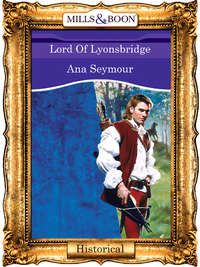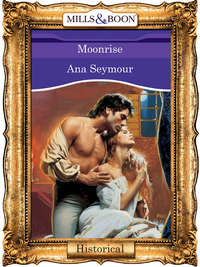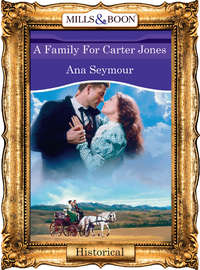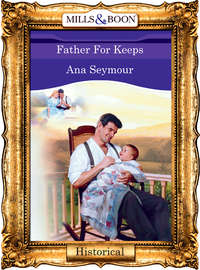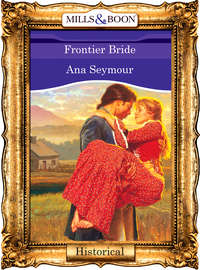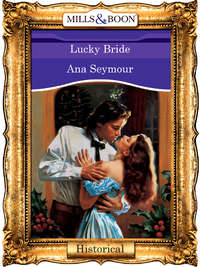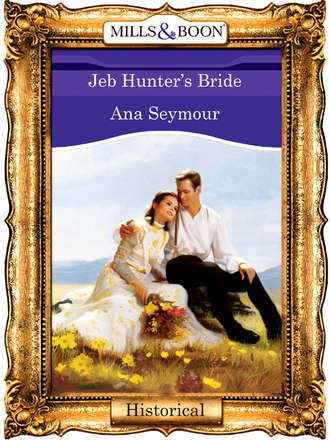
Полная версия
Jeb Hunter's Bride

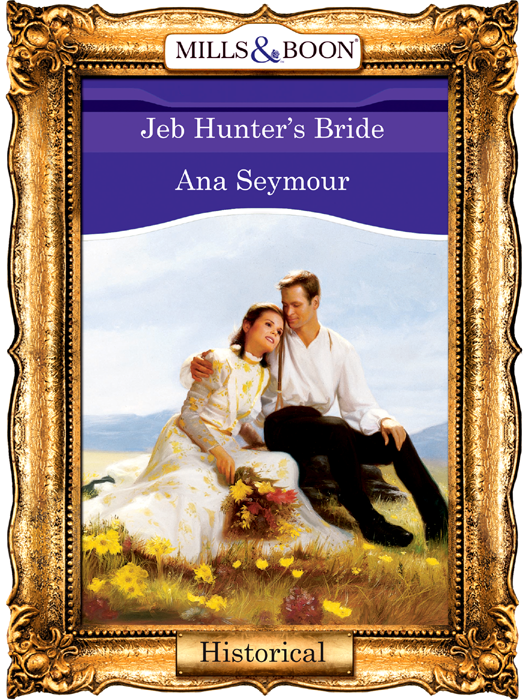
Table of Contents
Cover Page
Praise
Excerpt
Dear Reader
Title Page
About the Author
Dedication
Prologue
Chapter One
Chapter Two
Chapter Three
Chapter Four
Chapter Five
Chapter Six
Chapter Seven
Chapter Eight
Chapter Nine
Chapter Ten
Chapter Eleven
Chapter Twelve
Chapter Thirteen
Chapter Fourteen
Chapter Fifteen
Chapter Sixteen
Epilogue
Copyright
Praise for Ana Seymour’s previous books
Outlaw Wife
“…a fine romance…”
—Romantic Times
“…a satisfying tale…”
—Calico Trails
Lucky Bride
“…a lucky find…”
—Affaire de Coeur
“A Western winner!”
—Rendezvous
“…superb, enchanting…”
—Under the Covers
Gabriel’s Lady
“Ms. Seymour is rising to the top of the historical romance mountain at an incredible pace. 41/2

—Affaire de Coeur
“…a romantic treasure.”
—Rendezvous
Frontier Bride
“…a wonderful romance, filled with Western adventure…”
—Affaire de Coeur
“…a story that is not to be missed.”
—Rendezvous
“The train doesn’t take lone
women,” Kerry said
She’d anticipated a showdown with their wagon leader if her disguise was ever discovered. Well, the time had arrived. And she wasn’t going to let him intimidate her into backing down.
“You’re darn right it doesn’t,” Jeb said. “And for many good reasons.”
Kerry looked Jeb Hunter squarely in the eye. “I’d be interested in hearing those reasons, Captain. But right now I’m more concerned with getting some dry clothes and trying to figure out how we’re going to get my wagon out of the middle of the river!”
She turned her back on him and marched up the bank. Jeb Hunter felt his gut twist. A woman. Damnation, what a development. A lone woman on his train. And not just any woman—one who wouldn’t listen to orders and who had a stubborn streak as wide as Kansas…!
Dear Reader,
If your mother didn’t tell you about Harlequin Historical, this Mother’s Day might be a good time to let her in on the secret The gift of romance can enhance anyone’s life, and our May books promise to be a spectacular introduction. Critics have described Ana Seymour’s romances as “spirited,” “heartwarming” and “impossible to put down.” This author is sure to please with her latest title, Jeb Hunter’s Bride, the story of a feisty adventuress whose journey west heals the haunted soul of a handsome wagon train leader.
And don’t miss The Wilder Wedding, by up-and-coming author Lyn Stone, the story of a sensible heiress who believes she is dying and, determined to live for the moment, proposes to a dashing and dangerous private investigator Rae Muir returns with Twice a Bride, the second book of her captivating WEDDING TRAIL series. In this authentic Western, a trail scout’s daughter marries a rugged hunter to fulfill her father’s dying wish—only her father doesn’t die…
Rounding out the month is Lion’s Lady by award-winning author Suzanne Barclay. In this latest title featuring the stormy Sutherland clan, Lion Sutherland must choose between his duty to his clan and his undying passion for the woman he betrayed.
Whatever your tastes in reading, you’ll be sure to find a romantic journey back to the past between the covers of a Harlequin Historical. Happy Mother’s Day!
Sincerely,
Tracy Farrell
Senior Editor
Please address questions and book requests to:
Silhouette Reader Service
U.S.. 3010 Walden Ave., PO. Box 1325, Buffalo, NY 14269
Canadian. P.O. Box 609, Fort Erie, Ont. L2A 5X3
Jeb Hunter’s Bride
Ana Seymour

ANA SEYMOUR
has been a Western fan since her childhood—the days of shoot-’em-up movie matinees and television programs. She has followed the course of the Western myth in books and films ever since, and says she was delighted when cowboys started going off into the sunset with their ladies rather than their horses. Ms. Seymour lives with her two daughters near one of Minnesota’s ten thousand lakes.
For my aunt and uncle,
Betsy and Richard McCosh, m celebration of the
50th anniversary of their very own Western romance.
Prologue
Independence, Missouri
April 1857
Kerry closed her eyes as the scissors sliced through her long black hair. “Do it quick, Paddy, before I change my mind.”
“I wish you would change your mind,” her brother grumbled. “And stop calling me Paddy.” The shears clicked ruthlessly as shimmery cascades of hair fell to the ground around them.
“It’s the name our father called you. Out of respect for his memory, if nothing more, you should use it.”
Patrick Gallivan sighed. “Kerry, you were twelve when we came here—you remember the Old Country almost as well as Papa did. But I was only six. I’m American—I don’t want an Irish name.”
“You’re Irish, too.” Kerry’s eyes were still shut. “Is it too horrible to look at?”
Patrick stepped back and reviewed his handiwork. “Well, you don’t look like a man, if that’s what you’re asking. I don’t know how you expect to fool anyone.”
Kerry opened her eyes and slowly bent over the silver filigree mirror that had been her mother’s back in Duncannon. “Oh dear” was all she could say.
Patrick put down the scissors with a snort of disgust. “I knew you’d be sorry, Kerry. What a dumb idea.”
Kerry glared at her thirteen-year-old brother. “I suppose you’d rather go back to New York and stack boxes of fish for the rest of your life.”
Patrick shuddered. “I never even want to see another fish.”
“Then you’d better help me with this. Because otherwise there’s no way the association will let us stay with the wagon train. Single females are not allowed.”
Patrick’s face softened. “You’re not a single female, Kerry. You have a male protector—me.”
Kerry swallowed the lump that had lodged in her throat the minute she had seen her shorn head, and reached for her brother’s hand. “You are my protector, Pad…Patrick, but I don’t think the association leaders will see it that way.”
“The lawyer in St. Louis said that the contract Papa signed was”—he stopped and screwed up his mouth as he tried to remember the legal terms—“transferable in perpetuity to his heirs.”
“Yes, but he also said the members can vote to remove any wagon considered undesirable for the welfare of the group.”
For a moment neither said anything. They’d had enough of feeling undesirable since leaving Ireland. Instead of the golden land of promise they’d expected, New York City had proved remarkably hostile toward the small band of immigrants who had arrived in the fall of 1853 with little money and fewer prospects. It was no wonder that in the squalor of the overcrowded immigrant neighborhood Sean Gallivan had been immediately homesick for the green hills of his homeland. No wonder that he’d dreamed of reaching California, where a man could still live and support his family from the fruits of the land.
Finally Patrick grinned. “Well, if they do have the right to kick us off the wagon train, I guess we’ll just have to be sure they don’t want to. We’ll have to show them what a fine couple of lads we are.” His voice held the same brave determination that had helped Kerry keep going over the past horrible month. Her little brother was growing up, she’d thought more than once as they dealt together with her father’s sudden death. He was growing up just in time to face a world that sometimes seemed too harsh for even the strongest spirit.
Kerry smiled back at him. “So…do I look like a fine lad?” she asked with an exaggerated brogue that made the word sound like “foine.” Standing up from the table in the tiny boardinghouse room they’d shared since arriving in Independence two days ago, she put her hands on her hips and stalked across the room with giant steps. She was wearing a pair of Patrick’s trousers, which came well above her ankles, and a jacket of her father’s that hung on her narrow shoulders like a potato sack.
Her brother watched her thoughtfully. “You don’t have to walk like a rooster. Just move normally…only don’t, you know, sway your hips.”
Kerry’s eyes widened. “I never sway my hips.”
“Yes, you do.” He grinned mischievously. “When the Flanagan brothers used to come around, you would sway them even more.”
Kerry tugged at the hem of her father’s coat to cover more of the tight pants. “That shows how much you know, little brother. I hated the Flanagan brothers.”
“Not Mickey…” Patrick teased in a singsong tone.
Kerry gave a huff. “I don’t have time to listen to your nonsense. Tomorrow we face the head of the association, and if we can’t convince him that we’re capable of driving a rig to California, we’re in big trouble. So, truly now, how do I look?”
“You’ll have to wear boots to cover those bare ankles.”
“I’m going to wear yours. You can almost fit into Papa’s by now, the way your feet are growing.”
“Mine are too big for you,” he protested.
“I’ll make do.”
Patrick shook his head, still studying her. “I don’t know, sis. We’ll have to hope that this Captain Hunter is half-blind.”
“I don’t think we want our trail guide to be half-blind,” Kerry observed dryly, flopping down on the narrow cot that was the room’s only bed. Their funds were growing distressingly low, so they had taken the poorest room they could find, and Patrick had slept on the floor for the past two nights. Today they would hire a temporary wagon to take them, along with their father’s tools, which they had brought from New York, to Westport Landing. There they would join the encampment gathering along the banks of the Missouri River. The fully outfitted Conestoga their father had arranged through painstaking correspondence over the past few months should be waiting there for them.
Patrick laughed. “Well, not blind, maybe, just a little near-sighted. And you’ll have to try to keep out of his way as much as possible.”
Impatiently she tore off the oversize coat, revealing curves that would instantly give the lie to her deception. She threw the coat on the bed, then ran her hands threw her newly shorn hair. “All I want is to get to California.” With a last look in the mirror, she sighed. “I plan to stay out of everyone’s way—especially Captain Hunter’s. I hope the man never even knows I’m alive.”
Chapter One
Westport Landing, Kansas
April 1857
Jeb Hunter rode along the double row of wagons, nodding an occasional greeting to his newest band of pilgrims. The wagons always looked so fresh and pretty at this stage—their hickory-stretched covers flapping proudly in the gentle Kansas breeze. It was the largest group he had taken yet. From a trickle of daring pioneers a decade ago, the western flow had grown to a mighty river, so that by now at midseason the trail outposts—Fort Kearney, Fort Laramie and the like—were bustling cities with thousands of wagons passing through. But the numbers hadn’t lessened the danger, nor lowered the toll. Each time Jeb went across, the crosses marking trail deaths had multiplied like seeds scattered in the wind.
“Afternoon, Mr. Todd, Miz Todd,” Jeb called, flicking his finger against the brim of his leather hat. The Todds were exactly the kind of people he liked to have in his party. Frank Todd was coolheaded, strong and a good shot. And he only had a wife to watch out for—no children, no mother or sister-in-law to lessen the odds. One man protecting one woman, the way things were meant to be. Every time Jeb took on a big family with helpless females and children he felt the familiar knot in his stomach. It wasn’t as bad as it used to be. There had been times after he’d lost Melanie that the knot had gotten so big and tough, it would actually make him sick. He’d have to stop along the trail and puke out whatever had gone into his stomach over the past few hours. But nowadays he could usually swallow down the knot and get his mind back to other matters.
Frank Todd hollered back to him. “Will we be ready to roll on schedule tomorrow, Captain?”
Jeb nodded and reined his horse to pull closer to the Todds’ wagon. “We’re waiting on two more outfits, and they’re both due in this afternoon.”
“One will be those Irish boys, isn’t that right?” Eulalie Todd asked. At Jeb’s nod she continued, “Those poor boys with their father dropping dead so sudden like. It’s a wonder they still want to make the trip.”
Jeb frowned. “Their father already had his equipment all purchased. He did a good job of it, too. It’s a fine wagon. But I’m not too comfortable myself with the thought of the two of them tackling it alone. If we could talk them out of it, I’d be a mite relieved.”
“Don’t we want all the wagons we can get?” Frank asked.
“Not necessarily. We already have nearly fifty, and anything more than that can get difficult to manage.”
“Do you want me to talk to the boys when they get here?” Frank had been elected representative for the paying members of the association, which meant that Jeb could use him as an arbiter if there was a disagreement among the settlers. They also were carrying Jeb’s personal supplies and food. Once they started rolling, he would camp with them each night and share their cookfire.
“No, I’ll handle it. Legally, they’re signed on, and their wagon’s already been delivered here from Boone’s place. So if they’re up to it, I guess we’ll take them.”
Frank nodded his approval. “You tell them to call on Eulalie and me if they need some extra help.”
Jeb smiled. “The papers say Gallivan’s children are thirteen and nineteen years old. Thirteen’s barely out of knee britches, but I’m hoping that the nineteen-year-old will turn out to be a burly fellow who can pull his own weight.”
“Well now, I’d say nineteen’s a fine age to be starting a new life out West,” Eulalie Todd offered. “Most lads are in their prime by then. But they’ll be grieving still. You tell them to come on over and see Eulalie if they get to feeling poorly. I’ll feed them a nice hot bowl of turnip soup.” Her voice became wistful. “Back home we’d have the house full up of neighbor children every time I made my turnip soup.” She looked over her shoulder as if she might see all the way across the prairie to the neat brick house she had left behind in St Louis.
“I’ll do that, ma’am.” Jeb turned to her with the deep smile that lit his face only seldom these days. “And I’ll plan on polishing off a bowl or two of that soup myself.” He winked at her, then tipped his hat once again and rode away.
Patrick eyed their new wagon with a look of dismay. “How are we supposed to fit everything in there, sis? Papa’s tools alone will take up half the space.”
Kerry was thinking the same thing. She had that sick feeling in her stomach that had become so familiar since the day three weeks ago when she and Patrick had returned to their hotel room back in St. Louis to find their father slumped over the edge of his bed, still and cold. She took a deep breath. “We’ll take out all these supplies and put the toolboxes in first, then pile things on top of them. It’ll be tight, but I think we can do it.”
“And where do we sleep? On top of the roof?” Patrick’s voice gave signs of beginning its descent into manhood, but at the moment it was shrill, sarcastic and annoying.
“We’ll sleep on the roof if we have to in order to get all this to California. If Papa could bring these things all the way from Ireland, I can sure as shooting get them to California.”
Her brother leaped nimbly into the back of the wagon. “We could just take the metal pieces and leave some of the wooden things behind. I can make new ones myself when we get to California.”
This last was said with a deliberately casual air that told Kerry her brother knew perfectly well that his woodworking was not even close to the master craftsman level that had been passed along in the Gallivan family for generations. Patrick was good with his hands, but he had not had time to develop his father’s skill. But Kerry would never be the one to tell him this. “It was Papa’s dream to start a new life in California, Patrick. To start over on rich, new land and with the things he brought from home. Now that he’s gone, we’re going to do it for him. We’ll find the room.” Kerry bit down hard on her lip. This was not the time to give way to grief, or to discouragement “Maybe we don’t need all these supplies the Boone store sent. There are only two of us to feed now instead of three.”
“That’s right. Papa certainly won’t be eating anything this trip.” Patrick’s face brightened. “Maybe we could sell some of this food back to Boone’s and it would give us a little cash.”
Kerry tamped down her annoyance at her brother’s light tone. She knew that Patrick missed their father every bit as much as she did, but his youthful high spirits gave him the edge on dealing with his death. With each passing day, it seemed to be easier and easier for her brother to talk about him, to consign him to a place in the heart and mind reserved only for memories. Kerry had not reached that point. She still felt as if any minute she would turn the corner and see his dear, weathered face. When the realization hit that this would never happen again, she’d feel as if a hand was clutching at her throat, threatening to squeeze away her breath. Sean Gallivan was dead. After all his dreams, all his planning, all his saving, he would never see his dream fulfilled in the promised land of California. But she would.
“We’ll ask Captain Hunter when he shows up. In the meantime, let’s start moving some of these barrels out so we can get organized.”
“I thought the captain was supposed to be here to welcome us.”
Kerry pulled herself up beside her brother. There was scarcely room for the two of them inside the narrow bed of the wagon, which was already crammed full with the supplies her father had ordered. Patrick was right. There was no room left for the beloved woodworking tools that had been made by their great-grandfather—two heavy boxes of them that had already journeyed across an ocean and a third of a continent.
“Captain Hunter has many duties. I’m sure he’ll be along directly.”
Kerry was in no hurry for the meeting with the wagon train captain, knowing that the encounter would be the first true test of her disguise. This morning when they’d left Independence, Patrick had settled the roominghouse bill himself and the man at the livery stable had hardly given her a glance. And she was becoming more comfortable in her brother’s trousers. But she couldn’t hope to escape scrutiny forever.
She worried about her face. Before packing her mirror, she had taken a long look at herself. The short hair didn’t change the fact that her face was distinctly feminine—the lips full and red, the bright blue eyes heavily lashed. Her face was bronzed by the sun, not lily-white like that of the true ladies she had seen parading up and down Park Avenue back in New York. But her cheeks were smooth as polished marble. No one who came close would believe that they belonged to a man. Once they’d left the city this morning she’d rubbed dirt all over her face, much to her brother’s amusement.
“Hallo there!” A voice reached them from the front of the wagon.
Patrick jumped down and leaned around the edge. “We’re back here.”
From the dark shelter of the wagon, Kerry peered out at the man who was pulling up his horse next to her brother. Her first impression was that he was big. Even mounted in his saddle, she could tell that he was much taller than the immigrant lads she had spent time with back in New York. Fully half a foot taller than Mickey Flanagan, she’d wager.
“Mr. Gallivan?” the man asked, bending to look inside the wagon.
Kerry’s stomach tightened. “My father’s dead,” she said gruffly, remembering at the last minute to keep her voice low.
The man looked disconcerted. He rubbed a hand along a whiskery chin. “Ah…I know that. I’m sorry. We’ve been in touch with your lawyer, of course. But I was addressing you, sir. I’d be happy to call you by your first name, if you prefer, but I don’t know what it is. I’m Jeb Hunter,” he added.
Kerry sat back on her haunches and willed herself to stay calm. Of course, she was Mr. Gallivan now. And she’d have to do a better job of keeping her wits about her if she wanted her ruse to succeed.
Her brother calmly reached a hand toward the newcomer. “Pleased to meet you, Captain. I’m Patrick, and that’s Kerry. Skipping the ‘mister’ part would be fine with my…ah…brother.”
“Kerry?” the captain asked, still trying to see into the dim interior.
“Ah…Ker…ah…Kiernan.” Patrick corrected firmly.
Captain Hunter cocked his head. “Irish name, right? Well, are you two gentlemen finding everything to be satisfactory?”
Patrick looked at his sister to reply.
Kerry took a deep breath and spoke carefully in the deep voice she’d been practicing. “We seem to have a few more supplies than we can fit, Captain Hunter.”
Jeb grinned. “Old Albert Boone knows how to pack them in, that’s for sure. But I think you’ll find that they’ve given you just enough to cover your needs. The wagon may look crowded now, but you’ll get used to it.”
Kerry risked leaning a little into the sunlight. In spite of her resolution to stay away from Captain Hunter, he would have to see her face sometime, and it might as well be now. “The problem, Captain, is that we’ve brought a few items along with us from New York that have to go in our wagon.”
She noticed that he started a little when he saw her, and she quickly pointed behind him, hoping to distract his attention. Jeb gave her one more hard glance, then turned back toward the rented wagon. With a low whistle he swung a long leg over his horse and jumped to the ground. “What in the name of Jupiter is all that?”
He didn’t sound pleased. Kerry swallowed. “There’s some farm equipment, and the two boxes are my father’s tools.” The defensive tone made her voice creep higher.
Jeb stalked over to the freight wagon and looked at the jumbled contents with disbelief.
Once again Patrick took charge. “My brother and I are going to start our own ranch in California. My father brought those things with him when he came from Ireland.”


